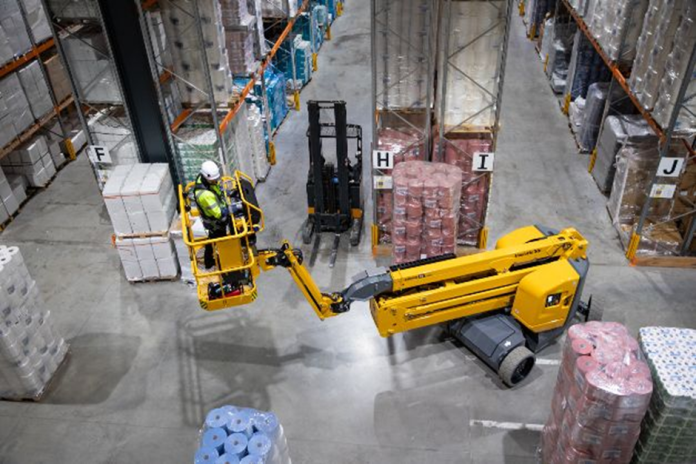Efficient warehouse operations are crucial for maintaining a competitive edge in today’s fast-paced business environment. Streamlining processes and optimizing the use of resources can significantly enhance productivity, reduce costs, and improve overall operational effectiveness. This article explores key strategies for enhancing warehouse operations, with a focus on utilizing boom lifts and pallet racks to drive efficiency.
Streamlining Warehouse Layout and Design
The foundation of an efficient warehouse is its layout. A well-organized warehouse minimizes travel time, reduces handling costs, and improves accuracy. Start by evaluating the current layout and identifying areas where space can be optimized. Implementing a strategic layout that facilitates smooth workflows is essential. Key considerations include the placement of inventory, workstations, and access points.
- Optimizing Aisle Widths: Adjusting aisle widths to accommodate the size of equipment and the flow of goods can enhance maneuverability and reduce congestion.
- Strategic Location of High-Turnover Items: Place frequently picked items closer to shipping areas to minimize travel time.
Implementing Advanced Inventory Management Systems
Effective inventory management is critical for maintaining stock levels and ensuring order accuracy. Advanced inventory management systems, such as barcode scanning and real-time tracking, can significantly improve warehouse efficiency. These systems provide accurate data on inventory levels, streamline order processing, and reduce the likelihood of stockouts or overstocking.
- Real-Time Data Access: Utilize software that offers real-time visibility into inventory levels, enabling better decision-making and faster response to stock changes.
- Automated Replenishment: Implement automated replenishment systems to maintain optimal stock levels and reduce manual monitoring efforts.
Maximizing Storage Solutions with Pallet Racks
Pallet racks are a vital component of warehouse storage, providing an organized system for storing goods and maximizing vertical space. Effective use of pallet racks can lead to significant improvements in warehouse efficiency.
- Selecting the Right Pallet Rack System: Choose from various pallet rack systems such as selective racks, drive-in racks, or push-back racks based on your warehouse’s needs. Selective racks offer easy access to individual pallets, while drive-in racks are ideal for high-density storage.
- Regular Maintenance and Inspection: Conduct regular inspections and maintenance of pallet racks to ensure safety and prevent potential hazards. Damaged racks should be repaired or replaced promptly to avoid accidents and disruptions.
- Optimizing Rack Height and Layout: Adjust rack heights and configurations to make the most of vertical space, considering the height of the warehouse and the size of the inventory.
Enhancing Warehouse Operations with Boom Lifts
Boom lifts are essential for accessing elevated areas and conducting tasks that require a higher reach. Utilizing boom lifts effectively can improve efficiency in various warehouse operations, from inventory management to maintenance tasks.
- Improving Accessibility: Boom lifts provide access to high storage areas, enabling workers to easily retrieve or store items located on higher shelves. This reduces the need for manual handling and enhances overall productivity.
- Streamlining Maintenance Tasks: Use boom lifts for regular maintenance and inspections of warehouse infrastructure, such as lighting and sprinkler systems. This ensures that all equipment remains in optimal condition and reduces downtime caused by equipment failures.
- Enhancing Safety: Proper training in the use of boom lifts can significantly reduce the risk of accidents and injuries. Ensure that operators are well-trained and adhere to safety protocols to maintain a safe working environment.
Leveraging Technology for Improved Efficiency
Integrating technology into warehouse operations can drive significant improvements in efficiency. Technologies such as automated guided vehicles (AGVs), robotics, and warehouse management systems (WMS) can streamline processes and enhance overall productivity.
- Automated Guided Vehicles (AGVs): Implement AGVs to automate material handling and transportation within the warehouse. AGVs can efficiently move goods between locations, reducing manual labor and increasing throughput.
- Warehouse Management Systems (WMS): Utilize WMS to optimize inventory management, track orders, and improve overall warehouse operations. A robust WMS can enhance accuracy, reduce processing time, and provide valuable insights for continuous improvement.
Continuous Training and Development
Investing in continuous training and development for warehouse staff is essential for maintaining high levels of efficiency. Training programs should focus on best practices, equipment handling, and safety protocols to ensure that employees are well-equipped to perform their tasks effectively.
- Regular Training Programs: Implement regular training sessions to keep staff updated on new technologies, equipment, and processes.
- Encouraging Employee Feedback: Foster an environment where employees can provide feedback on operational challenges and suggest improvements. Engaging staff in the optimization process can lead to valuable insights and enhancements.
Conclusion
Enhancing warehouse operations requires a multifaceted approach that includes optimizing layout and design, implementing advanced inventory management systems, utilizing effective storage solutions like pallet racks, and leveraging technology such as boom lifts. By focusing on these key areas and investing in continuous improvement, warehouses can achieve greater efficiency, reduce costs, and maintain a competitive edge in the market.


